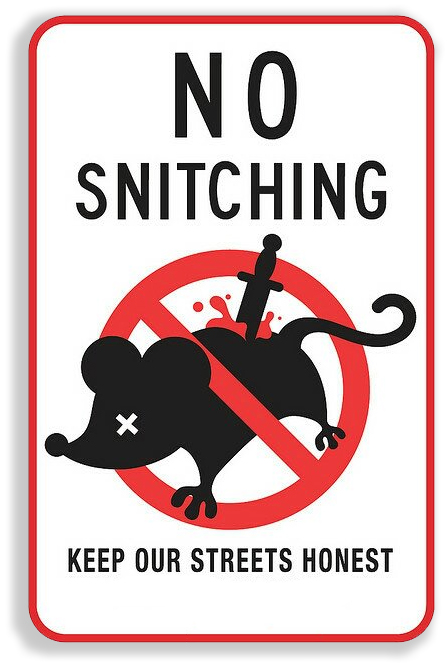We’re still doing a weekly newsletter … we’re just starting to post pieces of it every day. The news is fresher this way …
YOU DIRTY RAT
No one likes a snitch, which is one of society’s abiding ironies given that so many people – up to two-thirds of all drug defendants – cooperate with the government to get a break on their sentences.
 There are still some places – and you have a good idea where – in which informants may experience some pushback, like getting beaten up in the showers, getting their dogs shot, houses burned… that kind of thing. And, as with many things these days, the world of ratting out fellow defendants is changing because of the Internet.
There are still some places – and you have a good idea where – in which informants may experience some pushback, like getting beaten up in the showers, getting their dogs shot, houses burned… that kind of thing. And, as with many things these days, the world of ratting out fellow defendants is changing because of the Internet.
We’re not just talking about whosarat.com (a real website –if you go to rats.com, you’ll end up at a Disney movie site). Instead, we’re referring to the ease with which people can access all sorts of court information that used to be hard to find. Anyone with a PACER account and a defendant’s name has all sorts of detailed information at hand about the case, the plea agreement, and often the cooperation that the defendant gave law enforcement.
The problem is so pervasive, evidently, that a committee of the Judicial Conference of the United States, the administrative arm of the federal judiciary, is calling on all federal trial judges to impose new secrecy rules that would uniformly shield information about cooperators from public view. In a June 30th letter sent to all federal trial judges and clerks, Judge William Terrell Hodges – a federal trial judge in Florida who chairs the Conference’s Committee on Court Administration and Case Management – said “the harms to individuals and the administration of criminal justice in this instance are so significant and ubiquitous that immediate and effective action should be taken to halt the malevolent use of court documents in perpetuating these harms consistent with each court’s duty to exercise ‘supervisory power over its own records and files.”
The problem is particularly acute in prison, Judge Hodges wrote, because “new inmates are routinely required by other inmates to produce dockets or case documents in order to prove whether or not they cooperated. If new inmates refuse to produce the documents, they are punished.” “If they are identified as cooperators after arriving in prison, in many cases the only effective protection available is to move the threatened inmate into a segregated housing unit or solitary confinement,” Judge Hodges wrote.
Currently, each district judge has a personal set of “local rules” designed to keep certain sensitive information out of public view. Some judges will consider motions to seal the records, allowing access only to prosecutors, defense attorneys and court clerks. Others have expansive secrecy provisions that hide a great deal from the public. Some have no hard and fast rules at all, but instead resolve informant issues as they arise.
 The Judicial Conference recommends that judges keep a sealed supplement in the record of each criminal case that would contain “documents or transcripts that typically contain cooperation information,” whether there was cooperation or not. After awhile, the theory goes, because all defendants had the same sealed file in their case docket, it would be impossible to tell who narc’ed out his brothers and sisters, and who did not.
The Judicial Conference recommends that judges keep a sealed supplement in the record of each criminal case that would contain “documents or transcripts that typically contain cooperation information,” whether there was cooperation or not. After awhile, the theory goes, because all defendants had the same sealed file in their case docket, it would be impossible to tell who narc’ed out his brothers and sisters, and who did not.
Defense attorneys and free speech advocates say that the proposed new rules are bad for at least two reasons. First, they say, creating a sealed annex in every case could deprive the public and media of basic information that goes beyond the issue of cooperation. Second, new rules could have the perverse effect of making life even more dangerous for informants. The existence of a sealed supplement in each case file would mean every inmate was presumed to be a “snitch” unless proven otherwise. Lawyers could appreciate the nuance that everyone had a sealed file, so the file’s existence meant nothing, but this point may be a little too subtle for Snake up on D-Block to appreciate.
A Maine public defender argued that fellow inmates would “assume when it says sealed, this person is an informant.” The proposal, if implemented, “will multiply the number of inmates at risk exponentially without protecting anyone.” This same sealed supplement system now being pitched nationally once tried in Maine. It didn’t work and has been scrapped in favor of the more traditional case-by-case evaluation by judges and lawyers of how best to protect those at risk.
Marshall Report, Is the Internet endangering criminal informants? (August 1, 2016)

